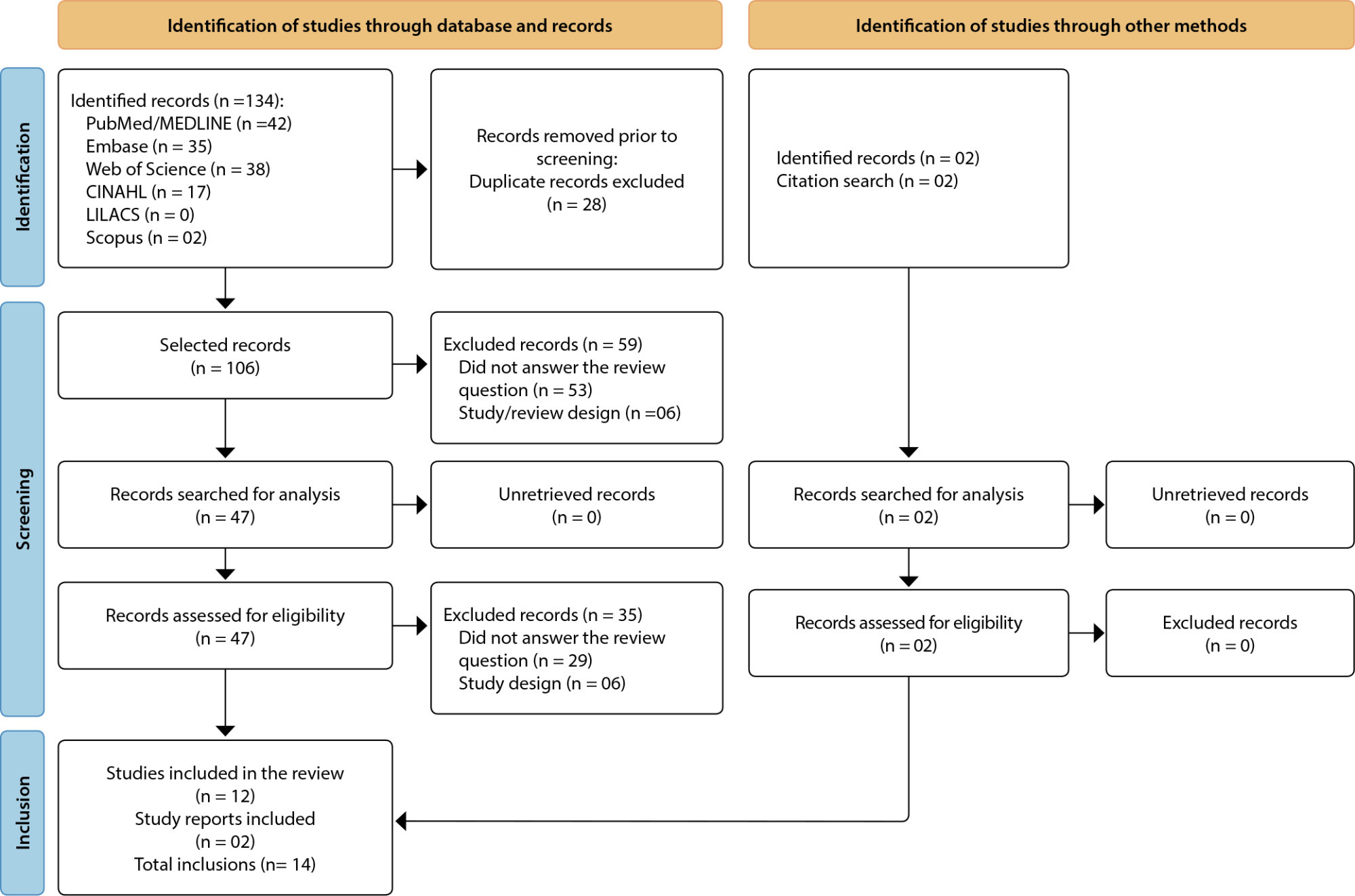-
ORIGINAL ARTICLE12-04-2023
Effect of cardiovascular biofeedback on nursing staff stress: a randomized controlled clinical trial
Revista Brasileira de Enfermagem. 2023;76(6):e20230069
Abstract
ORIGINAL ARTICLEEffect of cardiovascular biofeedback on nursing staff stress: a randomized controlled clinical trial
Revista Brasileira de Enfermagem. 2023;76(6):e20230069
DOI 10.1590/0034-7167-2023-0069
Views0See moreABSTRACT
Objective:
to assess the effect of cardiovascular biofeedback on nursing staff stress when compared to an activity without self-monitoring.
Method:
a randomized controlled clinical trial, carried out with nursing professionals from a university hospital. The intervention group (n=58) performed cardiovascular biofeedback, and the control (n=57) performed an online puzzle without self-monitoring, totaling nine meetings over three weeks. The outcome was assessed using the Stress Symptoms and Work-Related Stress scales, and the biological marker heart rate variability. The generalized estimating equations method was used.
Results:
the intervention had no effect on self-reported instruments (p>0.050). However, there was an effect of time (p<0.050) on all heart rate variability indicators, demonstrating changes over the sessions.
Conclusion:
cardiovascular biofeedback showed promising results in the biological marker, suggesting that it can be used in nursing staff as a complementary therapy by promoting better autonomic nervous system regulation.

-
Transition of Care for Individuals with Mental Disorders in Brazil: A Contextual Analysis
Revista Brasileira de Enfermagem. 2023;76(6):e20230063
Abstract
Transition of Care for Individuals with Mental Disorders in Brazil: A Contextual Analysis
Revista Brasileira de Enfermagem. 2023;76(6):e20230063
DOI 10.1590/0034-7167-2023-0063
Views0See moreABSTRACT
Objective:
To describe the contexts of care transition for individuals with mental disorders in the Brazilian setting.
Methods:
A contextual analysis was conducted through a scoping review. The search for studies was conducted in databases and thesis and dissertation portals, and the analysis was based on immediate, specific, general, and meta-contexts.
Results:
The sample, consisting of eight studies, indicated that the following factors are present in the contexts where care transition occurs: Peculiarities of care transition for individuals with mental disorders; Perspectives that can strengthen or weaken this transition; Approaches proposed in the past for the development of care transition; and Elements related to Brazilian legislation.
Final Considerations:
It is observed that the transition of care for individuals with mental disorders in Brazil takes place in various contexts of care levels. These variations present significant potentials and barriers in the care scenarios.
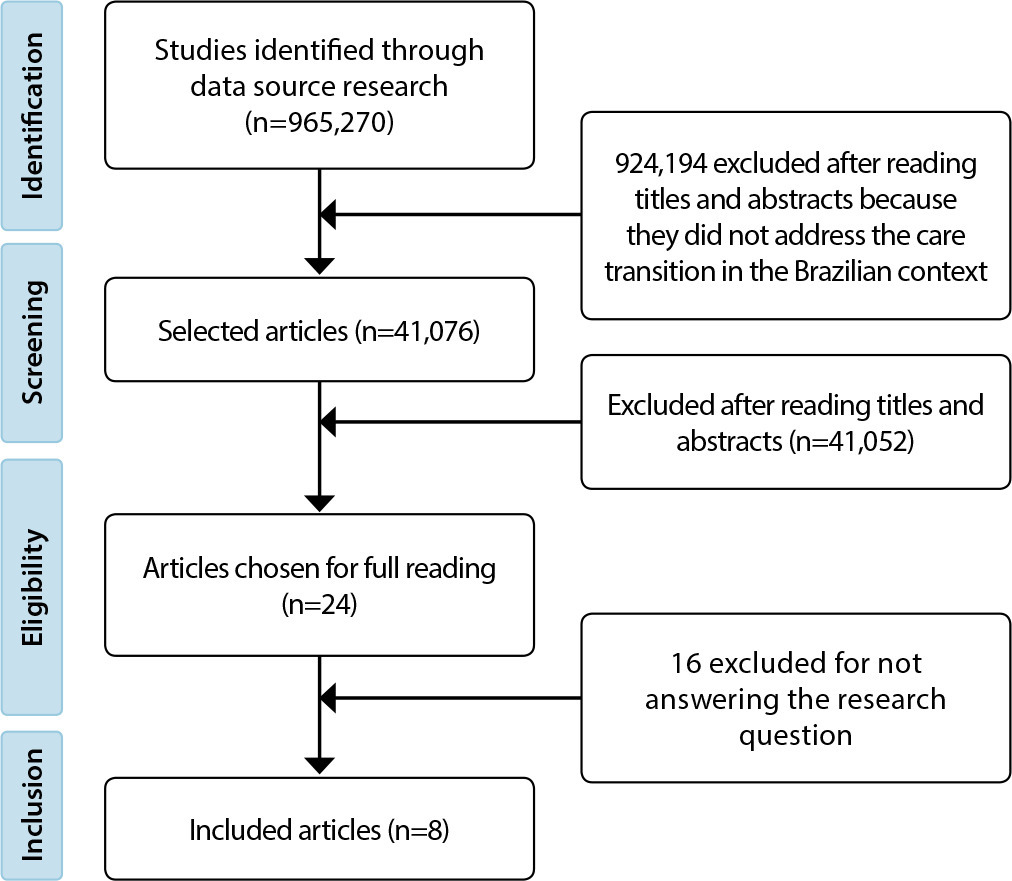
-
ORIGINAL ARTICLE12-04-2023
Sexual behavior according to undergraduate students: perspective of cross-cultural nursing and intersectional framing
Revista Brasileira de Enfermagem. 2023;76(6):e20220786
Abstract
ORIGINAL ARTICLESexual behavior according to undergraduate students: perspective of cross-cultural nursing and intersectional framing
Revista Brasileira de Enfermagem. 2023;76(6):e20220786
DOI 10.1590/0034-7167-2022-0786
Views0ABSTRACT
Objective:
to discuss undergraduate students’ sexual behavior from the perspective of social markers and cross-cultural care proposed by Madeleine Leininger.
Methods:
descriptive-exploratory qualitative research, with a theoretical-philosophical foundation in the Transcultural Theory. Convenience sample was composed of 57 young people from two universities in Rio de Janeiro. The focus groups’ content were analyzed lexically using the IRAMUTEQ software.
Results:
four classes emerged: Young people’s sexual scripts: between the fear of an unplanned pregnancy and the risk of exposure to sexually transmitted infections; Affective relationships: trust in steady sexual partners, apparent sense of security and disuse of condoms; Sexual practices, gender and cultural determinants: distinction in men’s and women’s role; Sexual partnerships, negotiation of condom use and vulnerability to sexually transmitted infections.
Final considerations:
challenges are perceived for the attention to undergraduate students’ sexual health, who verbalized risky sexual behaviors due to sociocultural vulnerabilities.
Keywords:Cross-Cultural NursingIntersectional FramingSexual BehaviorSexually Transmitted InfectionsYoung AdultSee more
-
Sleep quality of nurses who worked in coping with COVID-19: an integrative review
Revista Brasileira de Enfermagem. 2023;76(6):e20230007
Abstract
Sleep quality of nurses who worked in coping with COVID-19: an integrative review
Revista Brasileira de Enfermagem. 2023;76(6):e20230007
DOI 10.1590/0034-7167-2023-0007
Views0See moreABSTRACT
Objective:
to analyze sleep quality of nurses who worked coping with COVID-19 in scientific evidence.
Methods:
an integrative review, carried out in seven databases, including studies between December 2021 and June 2022, without language restrictions. The sample consisted of 15 primary studies.
Results:
nurses working in hospital, intensive care, outpatient care and teaching institutions constitute a vulnerable group for sleep disorders: latency, duration, efficiency and quality. The disorders identified involved insomnia at varying levels of severity: daytime dysfunction and morning sleepiness. Night work and low capacity for self-care were determinants of impaired sleep patterns.
Final considerations:
the COVID-19 pandemic contributed to greater vulnerability of nurses to changes in sleep, requiring strategies for risk management and well-being promotion.

-
ORIGINAL ARTICLE12-04-2023
Work and Mental Distress among Nurses in the Amazon Region of Brazil during the COVID-19 Pandemic
Revista Brasileira de Enfermagem. 2023;76(6):e20220792
Abstract
ORIGINAL ARTICLEWork and Mental Distress among Nurses in the Amazon Region of Brazil during the COVID-19 Pandemic
Revista Brasileira de Enfermagem. 2023;76(6):e20220792
DOI 10.1590/0034-7167-2022-0792
Views0See moreABSTRACT
Objective:
To assess the relationship between psychopathological symptoms and the social, clinical, and occupational profile of nurses in the Amazon region of Brazil during the COVID-19 pandemic.
Methods:
A descriptive cross-sectional online study was conducted in 2020 with 261 nurses. The Symptom Assessment Scale-40 was utilized.
Results:
The presence of pre-existing conditions before the pandemic was associated with psychotism (p=0.044). Experiencing constraints and/or violence at work during the pandemic was associated with somatization (p=0.025), and working hours were associated with anxiety (p=0.025). Nurses predominantly exhibited symptoms related to fear (33.7%), tension (34.5%), and a sense that something is wrong in the mind (22.6%).
Conclusions:
A significant association was observed between working hours and anxiety symptoms, the experience of constraints and/or violence at work during the COVID-19 pandemic and somatization symptoms, as well as between pre-existing conditions and psychotism symptoms related to COVID-19.
-
Simulation training of caregivers at hospital discharge of patients with chronic diseases: an integrative review
Revista Brasileira de Enfermagem. 2023;76(6):e20230043
Abstract
Simulation training of caregivers at hospital discharge of patients with chronic diseases: an integrative review
Revista Brasileira de Enfermagem. 2023;76(6):e20230043
DOI 10.1590/0034-7167-2023-0043
Views0See moreABSTRACT
Objective:
to identify evidence about the use and effects of clinical simulation for preparing caregivers for discharging patients with chronic conditions.
Methods:
an integrative peer review in the Scopus, PubMed, Web of Science, Cumulative Index to Nursing and Allied Health Literature, ScienceDirect and Virtual Health Library databases, from July to September 2022.
Results:
3,218 studies were identified, with a final sample consisting of four national and two international articles. Using simulation as an educational technology contributed to caregiver preparation in home care. In most studies, using clinical simulation included using other strategies to complement training: expository dialogued class, conversation circle and audiovisual resources.
Final considerations:
simulation proved to be efficient for training caregivers, with the active participation of family members and nurses in health education actions.
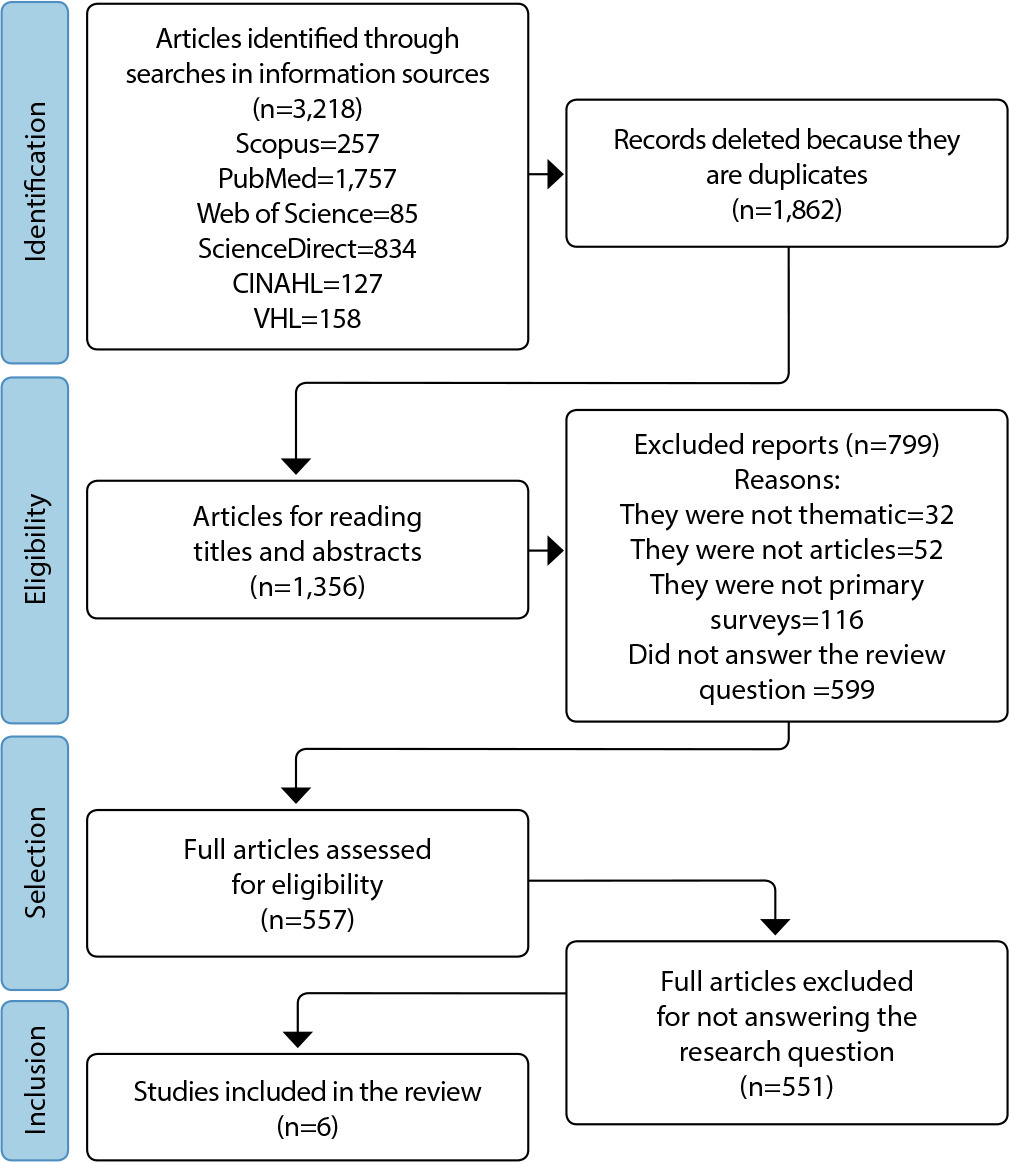
-
ORIGINAL ARTICLE12-04-2023
Feelings about birth by a group of high-risk pregnant women
Revista Brasileira de Enfermagem. 2023;76(6):e20230059
Abstract
ORIGINAL ARTICLEFeelings about birth by a group of high-risk pregnant women
Revista Brasileira de Enfermagem. 2023;76(6):e20230059
DOI 10.1590/0034-7167-2023-0059
Views0See moreABSTRACT
Objective:
to understand feelings about birth among a group of high-risk pregnant women.
Method:
a descriptive and qualitative study, using Alfred Schütz’s social phenomenology as a philosophical theoretical framework. The study included 25 pregnant women undergoing high-risk prenatal care. The interview had the following guiding questions: tell me about your feelings regarding the moment of birth/childbirth; How do you deal with the high-risk diagnosis? What are your expectations for birth/childbirth?
Results:
five categories emerged: Fear of obstetric care; Fear of complications with the baby; Fear of cesarean section; Resilience in the face of high-risk pregnancy; and Expectations for birth.
Considerations:
high-risk pregnant women are afraid of the care they will receive, the risks and concern about the baby’s vitality at birth. The importance of care is emphasized, with a welcoming environment, bonding and communication between health team and pregnant woman.
-
ORIGINAL ARTICLE10-28-2020
“Health does not discuss trans bodies”: Oral History of transsexuals and transvestites
Revista Brasileira de Enfermagem. 2020;73:e20190228
Abstract
ORIGINAL ARTICLE“Health does not discuss trans bodies”: Oral History of transsexuals and transvestites
Revista Brasileira de Enfermagem. 2020;73:e20190228
DOI 10.1590/0034-7167-2019-0228
Views0See moreABSTRACT
Objectives:
to understand the life stories and itineraries of transvestites and transsexuals in health services.
Methods:
study with a qualitative approach, anchored in the methodological framework of Oral History. Interviews were conducted and thematically analyzed.
Results:
two themes emerged: 1) gender and sexuality in life stories; and 2) the trajectories in health services. These revealed the challenges in the process of recognizing gender identity before the family and society. The reports show the dilemmas that transsexuals and transvestites face in health care, which ends up generating the removal of this population from services.
Final Considerations:
it has been demonstrated that Oral History can increase knowledge, especially about life histories and trajectories in the health services of transvestites and transsexuals; in addition, information was offered that can assist managers and health professionals in making decisions or caring for these people.
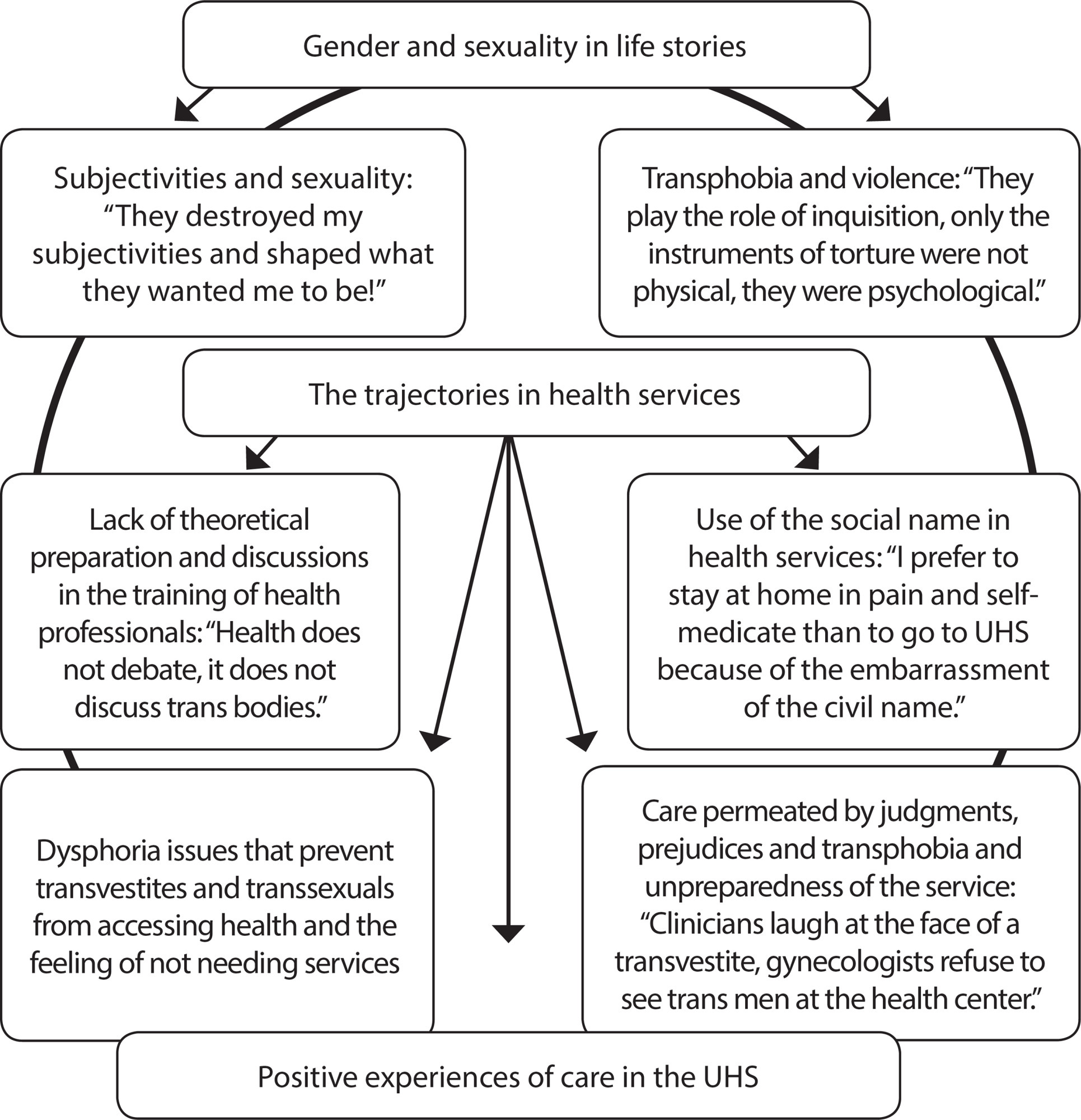
-
ORIGINAL ARTICLE07-10-2020
Working conditions and depression in hospital emergency service nurses
Revista Brasileira de Enfermagem. 2020;73:e20180952
Abstract
ORIGINAL ARTICLEWorking conditions and depression in hospital emergency service nurses
Revista Brasileira de Enfermagem. 2020;73:e20180952
DOI 10.1590/0034-7167-2018-0952
Views0ABSTRACT
Objective:
to analyze the presence, intensity and factors related to working conditions for depressive symptoms in hospital emergency nurses in the east of São Paulo.
Methods:
a descriptive, exploratory, quantitative and qualitative study, which applied psychometric scales and interview script.
Results:
nurses (95.24%) had depressive symptoms by the assessment scales by the observer, most with mild and moderate intensity. Inadequate working conditions led to suffering. Factors that trigger depressive symptoms were: disorganized work; harmful relationship with immediate management; inappropriate physician behavior; aggressions; lack of inputs, infrastructure and human resources; professional devaluation. Identified professionals with depressive symptoms who, because they were unaware of being affected by the disorder, did not seek treatment, continued to perform activities that compromised their physical and mental health, promoting damage to the assistance provided.
Final considerations:
high frequency of depressive symptoms. The precarious work environment negatively influenced the care and development of depressive symptoms.
Keywords:DepressionEmergency NursingHospital Emergency ServicesOccupational HealthWorking ConditionsSee more -
Chemsex and its repercussions on the health of men who have sex with men (MSM): a global health perspective
Revista Brasileira de Enfermagem. 2023;76(3):e20230004
Abstract
Chemsex and its repercussions on the health of men who have sex with men (MSM): a global health perspective
Revista Brasileira de Enfermagem. 2023;76(3):e20230004
DOI 10.1590/0034-7167-2023-0004
Views0See moreABSTRACT
Objectives:
to discuss the repercussions of chemsex on the health of men who have sex with men (MSM), contextualizing it in a global health scenario and pointing out the implications for nursing care.
Methods:
theoretical-reflexive study based on scientific literature and concepts related to global health.
Results:
we present the epidemiology of the chemsex phenomenon, the main demands of the field, the reasons why it has become a global public health problem, and the implications for nursing practice.
Final Considerations:
chemsex is growing in all age groups of MSM and is globally benefiting from location-based applications to gain magnitude, finding an important potential audience in the migrant population. Nursing structures can help accelerate the proposal and implementation of biomedical and behavioral measures to address chemsex in its entirety, qualifying care and inducing teamwork with interprofessional collaboration.
-
ORIGINAL ARTICLE05-24-2021
Critical thinking in nursing training: evaluation in the area of competence Education in Health
Revista Brasileira de Enfermagem. 2021;74:e20200979
Abstract
ORIGINAL ARTICLECritical thinking in nursing training: evaluation in the area of competence Education in Health
Revista Brasileira de Enfermagem. 2021;74:e20200979
DOI 10.1590/0034-7167-2020-0979
Views0ABSTRACT
Objective:
To analyze the constitution of critical thinking in nursing training in the approach by competence and the integrated curriculum, considering the evaluation process by capturing its challenges, and proposing overcoming strategies.
Methods:
Qualitative. In the first phase of data collection, interviews were conducted with twenty-four professors, nine preceptors, and fifteen students to reconstruct the profile of competence, and in the second phase, a workshop to validate the profile identified challenges and proposals. The Collective Subject Discourse was used to analyze the interviews and the holistic competence reference in reconstructing the profile.
Results:
The critical thinking is built based on experiences in the world of work, and evaluation is the conductor of reflections towards emancipation.
Final considerations:
It signals the importance of professor training in the learning evaluation and working with the collective construction of subjects to overcome challenges that happen in the changes of training.
Keywords:Competency-Based EducationEmployee Performance AppraisalNursesProfessional CompetenceThinkingSee more -
REVIEW11-25-2020
Nurse’s interventions in preventing falls in hospitalized children: scoping review
Revista Brasileira de Enfermagem. 2020;73:e20190409
Abstract
REVIEWNurse’s interventions in preventing falls in hospitalized children: scoping review
Revista Brasileira de Enfermagem. 2020;73:e20190409
DOI 10.1590/0034-7167-2019-0409
Views0See moreABSTRACT
Objectives:
map both nursing interventions for the prevention of falls in paediatric age during hospitalization and the instruments for assessing the risk of falls in paediatrics.
Methods:
scoping review according to the protocol of Joanna Briggs Institute, with acronym PCC (P – children, C – fall preventive nursing interventions and instruments for assessing the risk of falling, C – hospital admission), in three sources of information (EBSCO, PubMed and SciELO).
Results:
the sample consisted of seven articles. The education of the child/family is the basis of the interventions, and the instruments for assessing the risk of falling identified were: Humpty Dumpty Falls Scale, GRAF PIF, CUMMINGS, I’M SAFE and CHAMPS.
Conclusions:
the education of children/parents on preventive measures is important and should be reinforced during hospitalization, using different methodologies. The Humpty Dumpty Falls Scale was the most analyzed.
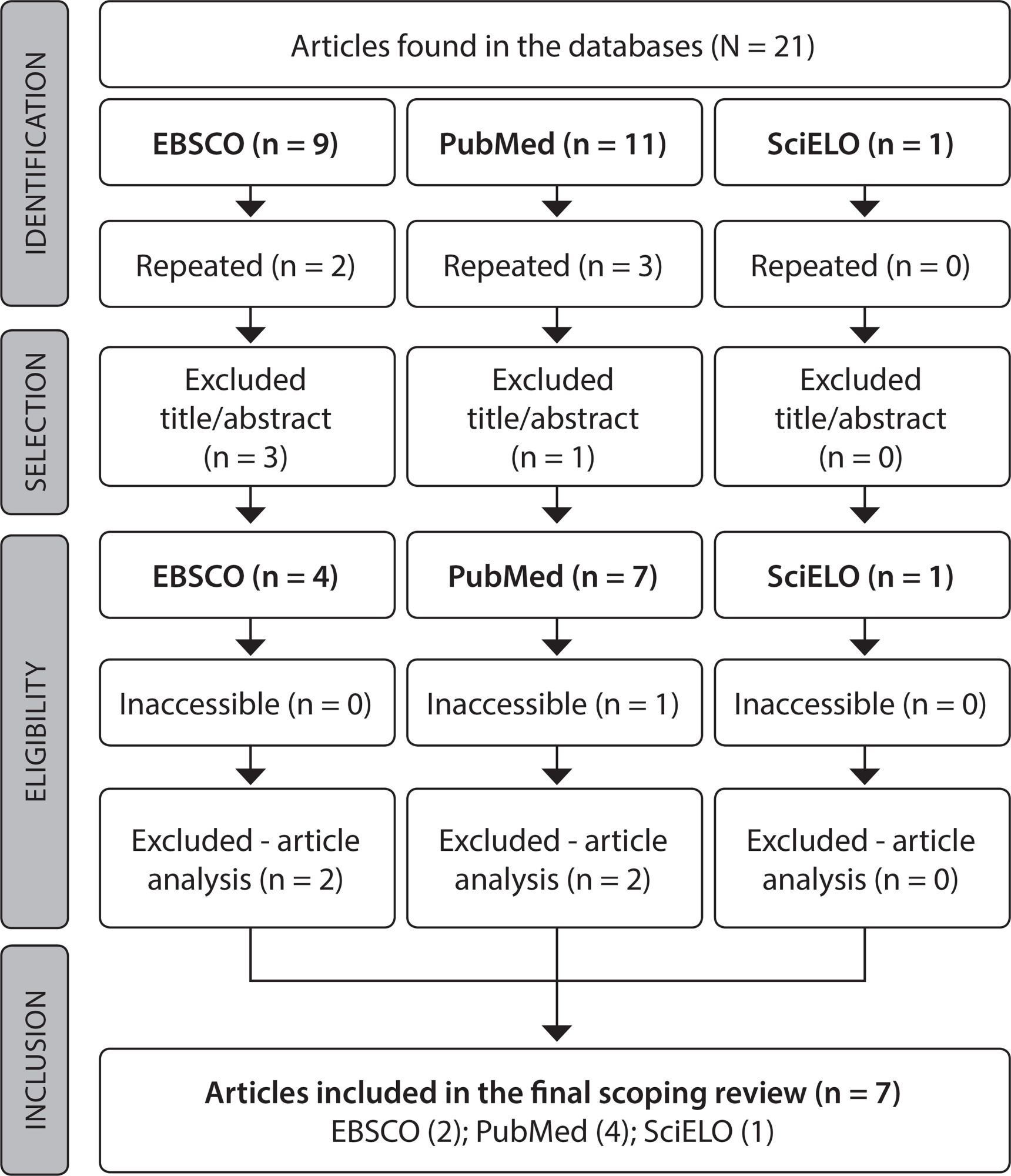
-
ORIGINAL ARTICLE06-14-2021
Mothers’ knowledge of premature newborn care and application of Kangaroo Mother Care at home
Revista Brasileira de Enfermagem. 2021;74(6):e20200717
Abstract
ORIGINAL ARTICLEMothers’ knowledge of premature newborn care and application of Kangaroo Mother Care at home
Revista Brasileira de Enfermagem. 2021;74(6):e20200717
DOI 10.1590/0034-7167-2020-0717
Views0See moreABSTRACT
Objective:
to identify mothers’ knowledge about premature newborn care and application of Kangaroo Mother Care at home.
Methods:
a descriptive, qualitative study carried out with 15 mothers of premature newborns in a reference Maternal and Child Hospital in northern Brazil using two semi-structured interviews with open- and closed-ended questions. The testimonies were analyzed using thematic analysis technique, proposed by Bardin.
Results:
two thematic categories originated: “Caring for a premature newborn at home: strengths and weaknesses” and “Applying Kangaroo Mother Care at home: new knowledge acquired during hospitalization”.
Final considerations:
the speeches of the interviewed mothers pointed out their knowledge about home care of premature NBs and understanding the importance of Kangaroo Mother Care, mainly acquired and improved with the guidance of professionals during hospitalization and application of the method, in addition to fears, possible difficulties in home care and the need to be better informed at hospital discharge.
-
ORIGINAL ARTICLE05-03-2021
Nursing care for patient in postoperatory heart surgery in the Intensive Care Unit
Revista Brasileira de Enfermagem. 2021;74(2):e20200163
Abstract
ORIGINAL ARTICLENursing care for patient in postoperatory heart surgery in the Intensive Care Unit
Revista Brasileira de Enfermagem. 2021;74(2):e20200163
DOI 10.1590/0034-7167-2020-0163
Views0See moreABSTRACT
Objective:
To investigate the critical nodes related to nursing care for patients in the postoperative period of cardiac surgery.
Methods:
Exploratory study with a qualitative approach. Data collected through semi-structured interviews with 27 members of the nursing team working in the Intensive Care Unit. Material submitted to thematic analysis.
Results:
Three categories emerged: Flaws in the professional qualification for patient care in the postoperative period of cardiac surgery; Team challenges concerning specific patient care in the postoperative period of cardiac surgery; and (dis) organization of work in the Intensive Care Unit and its impact on nursing care for patients in the postoperative period of cardiac surgery.
Final considerations:
Given the identification of the critical nodes, the professionals presented suggestions to overcome daily difficulties: investments in strategies for Permanent Education in Health; creation of tools to guide patient assistance in the postoperative of cardiac surgery; and provision of adequate human resources.
Search
Search in:
Nuvem de Tags
Aged (144) Atenção Primária à Saúde (239) COVID-19 (104) Cuidados de Enfermagem (269) Educação em Enfermagem (151) Educação em Saúde (139) Enfermagem (930) Estudos de Validação (131) Health Education (144) Idoso (208) Mental Health (149) Nursing (987) Nursing Care (306) Patient Safety (151) Primary Health Care (284) Qualidade de Vida (104) Quality of Life (106) Saúde Mental (145) Segurança do Paciente (150) Validation Studies (108)




